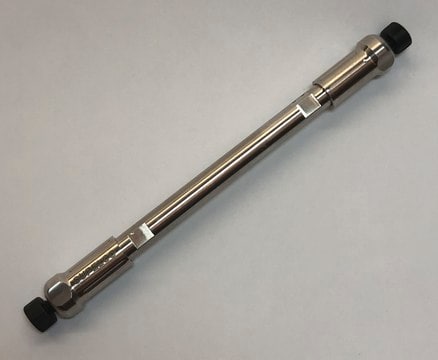66905-U
BIOshell A160 Peptide C18 (2.7 μm) HPLC Columns
L × I.D. 15 cm × 2.1 mm, HPLC Column
Synonym(s):
Superficially Porous Wide Pore C18 UHPLC Column
About This Item
Recommended Products
product name
BIOshell A160 Peptide C18, 2.7 μm HPLC Column, 2.7 μm particle size, L × I.D. 15 cm × 2.1 mm
material
stainless steel hardware
Quality Level
Agency
suitable for USP L1
description
Shell thickness (0.5 μm)
Solid Core (1.7 μm)
product line
BIOshell
BIOshell
feature
endcapped: no
analyte chemical class(es)
peptides
peptides
manufacturer/tradename
BIOshell
BIOshell
packaging
1 ea of
extent of labeling
4.6% carbon loading
parameter
600 bar max. pressure
90 °C max. temp.
technique(s)
HPLC: suitable
HPLC: suitable
LC/MS: suitable
LC/MS: suitable
UHPLC-MS: suitable
UHPLC-MS: suitable
UHPLC: suitable
UHPLC: suitable
L × I.D.
15 cm × 2.1 mm
surface area
90 m2/g
surface coverage
2.2 μmol/m2
matrix
spherical silica particle platform
superficially porous particle
superficially porous particle
matrix active group
C18 (octadecyl) bonding phase, diisobutyloctadecyl
particle size
2.7 μm
2.7 μm
pore size
160 Å
operating pH range
1-8
separation technique
reversed phase
reversed phase
Looking for similar products? Visit Product Comparison Guide
General description
Application
Features and Benefits
Legal Information
guard cartridge
Choose from one of the most recent versions:
Certificates of Analysis (COA)
Don't see the Right Version?
If you require a particular version, you can look up a specific certificate by the Lot or Batch number.
Already Own This Product?
Find documentation for the products that you have recently purchased in the Document Library.
Articles
This application note compares three different column chemistries from the BIOshell™ line of columns with superficially porous particles to evaluate their performance in peptide mapping.
This application note compares three different column chemistries from the BIOshell™ line of columns with superficially porous particles to evaluate their performance in peptide mapping.
This application note compares three different column chemistries from the BIOshell™ line of columns with superficially porous particles to evaluate their performance in peptide mapping.
This application note compares three different column chemistries from the BIOshell™ line of columns with superficially porous particles to evaluate their performance in peptide mapping.
Protocols
Chromatographic technique identifies insulin variants efficiently, aiding in pharmacokinetics.
Chromatographic technique identifies insulin variants efficiently, aiding in pharmacokinetics.
Chromatographic technique identifies insulin variants efficiently, aiding in pharmacokinetics.
Chromatographic technique identifies insulin variants efficiently, aiding in pharmacokinetics.
Our team of scientists has experience in all areas of research including Life Science, Material Science, Chemical Synthesis, Chromatography, Analytical and many others.
Contact Technical Service



